
Revista de la Federacion Argentina de Cardiologia
Scope & Guideline
Connecting research and practice in cardiovascular health.
Introduction
Aims and Scopes
- Clinical Cardiology and Cardiovascular Diseases:
The journal focuses on clinical research related to a wide range of cardiovascular diseases, including heart failure, myocardial infarction, arrhythmias, and congenital heart diseases, emphasizing evidence-based practices and treatment outcomes. - Innovative Diagnostic and Therapeutic Approaches:
It highlights studies on advanced diagnostic technologies and therapeutic interventions, such as catheter ablation, cardiac imaging techniques, and novel pharmacological treatments, contributing to improved patient management. - Epidemiological and Public Health Aspects:
The scope includes epidemiological studies that explore the prevalence and impact of cardiovascular diseases within specific populations, addressing public health concerns and preventive strategies. - Education and Training in Cardiology:
The journal is dedicated to the education and training of cardiologists, evidenced by surveys and recommendations aimed at improving the competencies of young cardiologists in Argentina. - Interdisciplinary Approaches to Cardiovascular Health:
There is a consistent focus on the intersection of cardiology with other medical fields, such as oncology and infectious diseases, reflecting the growing recognition of comorbidities in cardiovascular health.
Trending and Emerging
- Impact of Comorbidities on Cardiovascular Health:
There is a notable increase in research addressing the impact of comorbidities such as diabetes, HIV, and obesity on cardiovascular health, highlighting the importance of comprehensive care and management strategies for affected patients. - Artificial Intelligence and Technology in Cardiology:
Emerging studies on the application of artificial intelligence in diagnostics and treatment strategies are becoming more frequent, indicating a trend towards integrating technology to enhance patient care and outcomes. - Cardio-Oncology and Cancer-Related Cardiovascular Issues:
The collaboration between cardiology and oncology is increasingly prominent, as evidenced by the rise in publications focusing on cardiovascular complications in cancer patients, reflecting a growing awareness of the cardiotoxic effects of cancer treatments. - Cardiovascular Rehabilitation and Preventive Approaches:
Research on rehabilitation strategies, particularly in special populations such as oncology patients, is gaining attention, emphasizing the importance of recovery and preventive measures in cardiovascular care. - Sex and Gender Differences in Cardiovascular Disease:
The journal is increasingly addressing the role of gender in cardiovascular disease, including variations in clinical presentation and outcomes, thereby promoting a more nuanced understanding of the disease across different populations.
Declining or Waning
- Congenital Heart Disease in Pediatric Populations:
Research on congenital heart disease specifically affecting pediatric patients has seen a decrease, possibly due to the successful management strategies developed in previous years, leading to improved outcomes that require less frequent investigation. - Traditional Risk Factors without Novel Insights:
Topics focusing solely on traditional cardiovascular risk factors, such as hypertension and hyperlipidemia, are less prevalent, suggesting a shift towards more complex and multifactorial investigations that incorporate new technologies and methodologies. - Historical Perspectives on Cardiology:
Papers that review historical practices or older methodologies in cardiology are becoming less common, as the journal increasingly prioritizes contemporary studies that reflect current challenges and innovations in the field.
Similar Journals
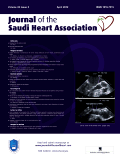
Journal of the Saudi Heart Association
Empowering Heart Health Through Research and CollaborationThe Journal of the Saudi Heart Association is a prominent scholarly publication dedicated to advancing knowledge in the fields of cardiology and cardiovascular medicine. Published by DIGITAL COMMONS BEPRESS, this open-access journal has been serving the global community since 2009, providing a vital platform for researchers, practitioners, and students interested in the latest developments in heart health and disease management. With an ISSN of 1016-7315 and a growing repository of knowledge alongside an E-ISSN of 2212-5043, the journal showcases an array of peer-reviewed articles that contribute to the understanding of cardiovascular conditions. Although categorized in the Q4 quartile for 2023, it remains committed to offering valuable insights, particularly within the constraints of the 29th percentile rank specified by Scopus. As the journal converges towards 2024, it continues to foster collaboration, innovation, and inquiry within the Saudi Arabian and international medical communities.

Frontiers in Cardiovascular Medicine
Connecting Global Insights for Heart Health Advancement.Frontiers in Cardiovascular Medicine is a leading open-access journal published by FRONTIERS MEDIA SA, dedicated to advancing research in the field of cardiology and cardiovascular medicine. Since its inception in 2014, the journal has become a vital platform for the dissemination of high-quality research, boasting a commendable Q2 rank in the 2023 category for Cardiology and Cardiovascular Medicine. With a focus on promoting innovative studies and clinical insights, Frontiers in Cardiovascular Medicine facilitates open access to its content, allowing researchers, healthcare professionals, and students from around the globe to engage with the latest findings which are critical for the advancement of cardiovascular health. The journal's significant presence in the academic landscape, as indicated by its Scopus ranking (161/387 and 58th percentile), underscores its importance as a research outlet in this essential field. Located in Lausanne, Switzerland, the journal continues to support the global cardiovascular community by encouraging collaboration and knowledge sharing to address the challenges faced in cardiovascular medicine today.
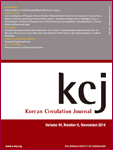
Korean Circulation Journal
Advancing Cardiovascular Knowledge, One Study at a Time.Korean Circulation Journal, published by the Korean Society of Cardiology, has established itself as a prominent platform for disseminating research in the fields of Cardiology and Cardiovascular Medicine. With an ISSN of 1738-5520 and an E-ISSN of 1738-5555, this journal has been at the forefront of cardiovascular science since its inception in 2006 and is projected to continue until 2024. The journal's commitment to quality is reflected in its 2023 category quartiles, ranking in the second quartile (Q2) for both Cardiology and Internal Medicine, as well as its commendable Scopus rankings within the respective fields. Located in South Korea, the journal aims to bridge the gap between cutting-edge research and practical applications, serving as an invaluable resource for researchers, healthcare professionals, and students keen on advancing their understanding of cardiovascular health. Although currently not an open-access journal, it provides a wealth of knowledge that encourages evidence-based practice in clinical settings.
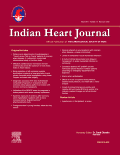
Indian Heart Journal
Unveiling the Future of Heart Health ResearchIndian Heart Journal, published by Elsevier, is a distinguished peer-reviewed journal dedicated to the field of cardiology and cardiovascular medicine. Founded in 1961, this journal has been a pivotal resource for researchers, healthcare professionals, and students, providing a platform for innovative studies and insights into heart health. The journal transitioned to an Open Access model in 2013, ensuring widespread dissemination of vital research findings to enhance global understanding of cardiovascular diseases. Ranked in the Q3 category for Cardiology and Cardiovascular Medicine in 2023, it holds a reputable position in the medical community, with a Scopus rank of #222 out of 387 journals in the same field, placing it in the 42nd percentile. The Indian Heart Journal strives to foster advances in clinical practice and research while addressing the unique cardiac health challenges faced in India and beyond.

Nepalese Heart Journal
Illuminating the Path to Cardiovascular WellnessNepalese Heart Journal, published by the CARDIAC SOC NEPAL, serves as a premier platform for disseminating knowledge in the field of cardiology and cardiovascular health. With an ISSN of 2091-2978, this journal aims to bridge the gap between researchers, clinicians, and academicians by presenting high-quality, peer-reviewed articles that address clinical practices, innovative research, and emerging trends in heart disease management, especially within the context of Nepal and the surrounding region. Although it operates under a traditional publishing model, its commitment to excellence aids in reinforcing the scientific discourse in an area critical to public health. The journal is a valuable resource for professionals and students alike who are focused on advancing their understanding of cardiology and its implications for health policy and practice. Exploring the intersections of local challenges and global advancements in heart health, the Nepalese Heart Journal is poised to contribute meaningfully to the evolving landscape of cardiovascular research.

HEART AND VESSELS
Transforming Heart Health Through Scholarly ExcellenceHEART AND VESSELS is a prominent peer-reviewed journal published by SPRINGER, dedicated to advancing the fields of cardiology and cardiovascular medicine. With its ISSN 0910-8327 and E-ISSN 1615-2573, this esteemed journal encompasses a broad range of topics pertinent to heart health, vascular function, and associated therapies, making it an essential resource for researchers, clinicians, and healthcare professionals alike. Based in Japan and operating since 1985, HEART AND VESSELS has consistently maintained a Q2 ranking in the 2023 category quartiles, highlighting its relevance and impact in the cardio domain. Although it does not offer open access, the journal ensures high-quality publications that contribute significantly to the academic and clinical understanding of cardiovascular health. With over three decades of continuous scholarly contribution, HEART AND VESSELS serves as a vital platform for disseminating cutting-edge research and fostering innovative practices in the management of cardiovascular diseases.
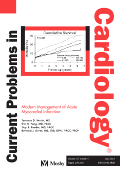
CURRENT PROBLEMS IN CARDIOLOGY
Driving Progress in Heart Health ResearchCURRENT PROBLEMS IN CARDIOLOGY is a leading peer-reviewed journal published by MOSBY-ELSEVIER, dedicated to advancing the field of cardiology through comprehensive analyses of contemporary challenges faced by cardiovascular practitioners. With its ISSN 0146-2806 and E-ISSN 1535-6280, this esteemed journal has been a crucial resource for researchers, clinicians, and students alike since its inception in 1976, and continues to publish groundbreaking studies and reviews up until 2024. As a testament to its scholarly impact, CURRENT PROBLEMS IN CARDIOLOGY boasts a prestigious Q1 ranking in both Cardiology and Cardiovascular Medicine, as well as in the broader category of Medicine (miscellaneous) in the 2023 metrics, positioning it among the top journals in its field. With a Scopus ranking of #127 out of 387 in Cardiology, and a 67th percentile ranking, it remains a vital platform for disseminating high-quality research that addresses critical issues in cardiovascular health. Researchers and practitioners looking to stay at the forefront of cardiac medicine will find this journal an indispensable tool for informed decision-making and practice improvement.
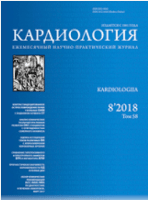
KARDIOLOGIYA
Cultivating a Legacy of Cardiac ResearchKARDIOLOGIYA is a renowned academic journal in the field of cardiology, published by the Russian Heart Failure Society. Since its inception in 1961, this journal has been dedicated to disseminating cutting-edge research in cardiovascular medicine, contributing to the global understanding of heart-related diseases and their management. With a significant publication history that spans over six decades, KARDIOLOGIYA provides a platform for both established researchers and emerging scholars to publish their findings. Despite its current Q4 category ranking in the 2023 Cardiology and Cardiovascular Medicine category, the journal plays a crucial role in promoting regional insights and advancements in cardiology, while striving towards higher visibility and impact within the academic community. While not an open-access journal, the journal is accessible to institutions and professionals in the Russian Federation and beyond, fostering collaboration and knowledge sharing among healthcare professionals. With a Scopus rank of #259 among 387 journals, it is well-positioned to enhance discourse in the field and support the development of innovative approaches to cardiovascular care.
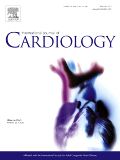
International Journal of Cardiology
Exploring New Frontiers in Heart Disease UnderstandingThe International Journal of Cardiology is a premier publication in the field of Cardiology and Cardiovascular Medicine, published by Elsevier Ireland Ltd. With an impressive impact factor and ranked in the top quartile (Q1) of its category, this journal serves as a vital resource for researchers, clinicians, and scholars committed to advancing cardiovascular health. Founded in 1981, the journal has been pivotal in disseminating significant findings, with a wide-ranging scope that includes original research, reviews, and clinical studies aimed at improving patient outcomes and understanding heart diseases. Its robust ranking of #73 out of 387 in Scopus ensures that it remains a leading platform for impactful cardiovascular research. While currently not an open-access publication, the journal's commitment to quality and relevance makes it an essential reference point within an ever-evolving medical landscape. For those engaged in cardiovascular research, the International Journal of Cardiology is not just a journal; it's an indispensable source of knowledge shaping the future of heart health.
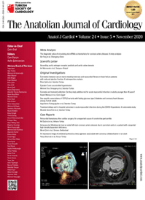
Anatolian Journal of Cardiology
Transforming Cardiology with Rigorous Research and Peer Review.The Anatolian Journal of Cardiology, published by KARE PUBL, stands as a vital resource in the field of Cardiology and Cardiovascular Medicine. With an ISSN of 2149-2263 and E-ISSN 2149-2271, this Open Access journal has been fostering the dissemination of critical research since 2001, ensuring that high-quality content is freely available to a global audience. Based in Turkey, the journal aims to bridge gaps in cardiological knowledge through rigorous peer-reviewed articles that span a wide range of topics, from innovative clinical practices to groundbreaking research findings. While its current ranking places it in the Q3 category of cardiology journals, the Anatolian Journal of Cardiology continues to strive towards enhancing its impact, currently holding a Scopus rank of 236 out of 387. Researchers, practitioners, and students alike will find this journal an essential platform for keeping abreast of the latest developments in cardiovascular health.